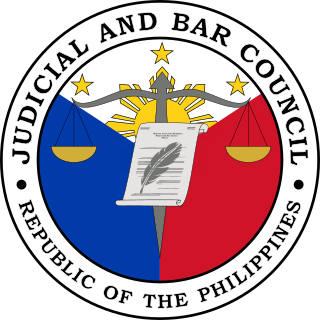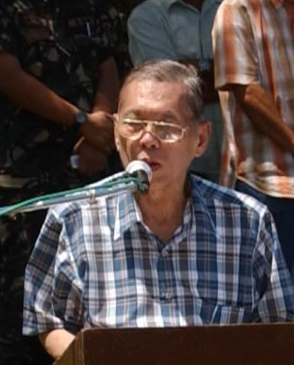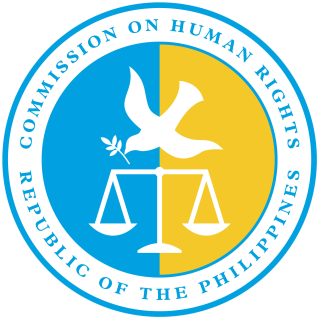
The president of the Philippines is the head of state, head of government and chief executive of the Philippines. The president leads the executive branch of the Philippine government and is the commander-in-chief of the Armed Forces of the Philippines.

The Commission on Higher Education is a government agency under the Office of the President of the Philippines. It is responsible for regulating and governing all higher education institutions and post-secondary educational programs in the country.

The government of the Philippines has three interdependent branches: the legislative, executive, and judicial branches. The Philippines is governed as a unitary state under a presidential representative and democratic constitutional republic in which the president functions as both the head of state and the head of government of the country within a pluriform multi-party system.
Impeachment in the Philippines is an expressed power of the Congress of the Philippines to formally charge a serving government official with an impeachable offense. After being impeached by the House of Representatives, the official is then tried in the Senate. If convicted, the official is either removed from office or censured.

The National Economic and Development Authority is an independent cabinet-level agency of the Philippine government responsible for economic development and planning. It is headed by the president of the Philippines as chairman of the NEDA board, with the Secretary of Socioeconomic Planning as vice-chairman. A number of Cabinet members, the Governor of the Bangko Sentral ng Pilipinas, the Chairperson of the Metropolitan Manila Development Authority, the Chief Minister of Bangsamoro, the Secretary of Information and Communications Technology, the Chairman of the Subic–Clark Area Development Corporation, and the National President of the Union of Local Authorities of the Philippines are members of the NEDA Board.

The Judicial and Bar Council of the Philippines is a constitutionally-created body that recommends appointees for vacancies that may arise in the composition of the Supreme Court, other lower courts, and the Legal Education Board, and in the offices of the Ombudsman, Deputy Ombudsman and the Special Prosecutor.

The Sandiganbayan is a special appellate collegial court in the Philippines that has jurisdiction over criminal and civil cases involving graft and corrupt practices and other offenses committed by public officers and employees, including those in government-owned and controlled corporations. The special court was established by Presidential Decree No. 1486. It was subsequently modified by Presidential Decree No. 1606 and by Republic Acts 7975, 8249 and 10660. It is equal in rank to the Court of Appeals, and consists of fourteen Associate Justices and one Presiding Justice. The Office of the Ombudsman owns exclusive authority to bring cases to the Sandiganbayan.

Conchita Carpio-Morales is a former Ombudsman of the Philippines serving from 2011 to 2018. Prior to her appointment as Ombudsman, she held the post of Associate Justice of the Supreme Court of the Philippines, served in the Lower Courts, as well as in the Department of Justice. She has secured appointments from five Philippine presidents: Ferdinand Marcos, Corazon Aquino, Fidel Ramos, Gloria Macapagal Arroyo, and Benigno Aquino III.

Prospero Arreza Pichay Jr., also known as Butch Pichay, is a Filipino politician who served as Representative of Surigao del Sur's 1st district in the Philippine House of Representatives from 1998 to 2007 and from 2016 to 2022. He was the chairman of the House Committee on National Defense in the 13th Congress and deputy speaker in the 17th and 18th Congresses. He is a member of the formerly dominant political party Kabalikat ng Malayang Pilipino and was a senatorial aspirant in the 2007 Philippine Senate election but lost.

Raul Maravilla Gonzalez was the Chief Presidential Legal Counsel and was the Secretary of Justice of the Philippines. He was replaced by Agnes Devanadera in 2009 from the orders of Gloria Macapagal Arroyo.
Simeon V. Marcelo is a Filipino lawyer and was the third Ombudsman of the Philippines. As the Ombudsman, he acted as protector of the people against the illegal and unjust acts of those who are in the public service. He investigated government officials, including members of the police and the military, who were suspected of committing graft and corruption. Notably, he served as the principal private prosecutor in the impeachment case of Former President Joseph Estrada, the 13th President of the Republic of the Philippines. After 3 years as Ombudsman, he resigned due to serious health problems. He was then replaced by Ma. Merceditas N. Gutierrez.

The Commission on Human Rights (CHR) is an independent constitutional office created under the 1987 Constitution of the Philippines, with the primary function of investigating all forms of human rights violations involving civil and political rights in the Philippines.
The Constitution of the Philippines is the supreme law of the Philippines. Its final draft was completed by the Constitutional Commission on October 12, 1986, and ratified by a nationwide plebiscite on February 2, 1987. The Constitution remains unamended to this day.
The Fertilizer Fund scam is a Philippine political controversy involving accusations that Agriculture Undersecretary Jocelyn Bolante diverted ₱728 million in fertilizer funds to the 2004 election campaign of President Gloria Macapagal Arroyo.
The Presidential Commission on Good Government (PCGG) is a quasi-judicial government agency of the Philippines whose primary mandate is to recover the ill-gotten wealth accumulated by Ferdinand Marcos, his immediate family, relatives, subordinates and close associates, whether located in the Philippines or abroad. It was created by President Corazon Aquino shortly after she was sworn in as president in the aftermath of the 1986 People Power revolution. In addition to recovering the Marcos wealth, it is also tasked with investigating other cases of graft and corruption; and instituting of corruption prevention measures.

Dennis B. Funa is a Filipino lawyer, businessman, public official, law book author, professor of law, constitutionalist, and the current Commissioner of the Philippines' Insurance Commission. As a Filipino lawyer, he is the managing partner of a Metro Manila based law firm. He has served the Philippine government from 1992 to 1998, and 2013 to the present in various capacities.

The Philippines suffers from widespread corruption, which developed during the Spanish colonial period. According to GAN Integrity's Philippines Corruption Report updated May 2020, the Philippines suffers from many incidents of corruption and crime in many aspects of civic life and in various sectors. Such corruption risks are rampant throughout the state's judicial system, police service, public services, land administration, and natural resources.
The Philippine Truth Commission was created to find out the truth about reports of large scale graft and corruption in the previous government; to put a closure to them by the filing of the appropriate cases against those who were involved. Furthermore, to deter others from committing such crimes and to restore the people's faith and confidence in the government and in their public servants. On July 30, 2010, President Benigno Aquino III set up the Philippine Truth Commission to find out the truth about reports of large scale graft and corruption in the previous government and to put a closure to them by the filing of the appropriate cases against those who were involved. Furthermore, to prevent others from committing such crimes and to restore the people's faith and confidence in the government and in their public servants.
The following are the events in related to Philippine law in 2016. This includes developments in criminal investigations of national notability.
The judiciary of the Philippines consists of the Supreme Court, which is established in the Constitution, and three levels of lower courts, which are established through law by the Congress of the Philippines. The Supreme Court has expansive powers, able to overrule political and administrative decisions, and with the ability to craft rules and law without precedent. It further determines the rules of procedure for lower courts, and its members sit on electoral tribunals.















